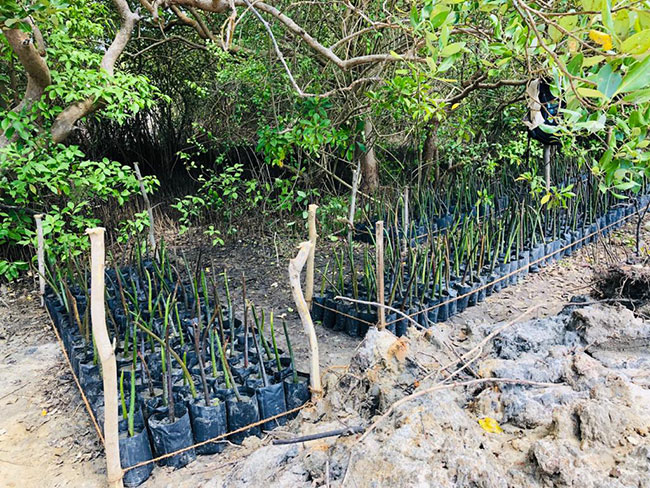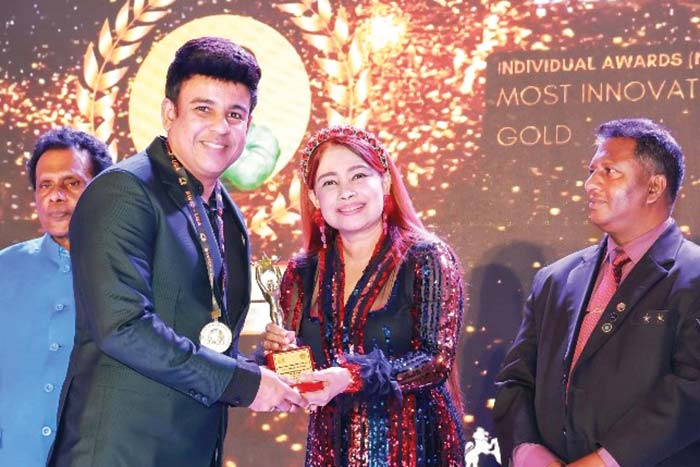Business
WNPS Anawilundawa wetland regeneration project achieves key milestones with generous support of Hemas Plc

Sri Lanka’s current mangrove cover, estimated to be 15-000 19,000 Hectares, is a mere 0.3% of the total landmass and is critically low, putting the island at risk from the impact of climate change and natural disasters such as storm surges and Tsunamis. Mangroves are an integral part of our forests and constitute about 2% of Sri Lanka’s total forest cover – they are very much a part of the fast dwindling 17% of our primary forests.
WNPS’s Accelerated Natural Regeneration of Mangroves (ANRM) Project was launched with the goal of regenerating the damaged mangrove habitats in Anawilundawa Wetlands and building sustainable livelihoods in surrounding communities. The project aims to restore approx. 45 hectares (110 acres) of the mangrove ecosystem at Anawilundawa, which have been destroyed due to shrimp farming.
WNPS partnered the Department of Wildlife Conservation on this project in the first half of 2020 and despite the chaos caused by the Covid-19 pandemic, the project has successfully reached its initial milestones including recording of the faunal and floral species in a section of the surrounding habitats, creating a mangrove plant nursery using harvested seeds from the site and establishing baseline data for the project.
This important conservation project is to be conducted by Sri Lanka’s Department of Wildlife Conservation (DWC), Department of Forests (FD), Wayamba University (Science Partner), facilitated by the Wildlife & Nature Protection Society (WNPS).
Referred to as “Blue forests” coastal and marine ecosystems consisting of mangrove forests, seagrass meadows and tidal salt marshes are some of the most efficient carbon sequestration tools found in nature. They can store up to ten times more CO2 per unit area than tropical rainforest, making them a powerful weapon against global warming and climate. These natural ecosystems also play a key role in the country’s coastal protection and provides protection from storm surges and catastrophic events like floods & tsunamis. Not only this, mangrove ecosystems provide sustainable livelihoods for many rural communities.
In the late 1990’s over 50% of Sri Lanka’s Mangrove habitat was destroyed to establish Shrimp Aquaculture, severely affecting the functioning of coastal ecosystems. This destruction of ecosystems is compounded by the fact that it also cripples livelihoods that depended on Mangroves associated small industries like Artisanal Fishing, Firewood, Herbal Medicine and Tourism. Anawilundawa Wetlands was one such damaged habitat, which is a wetland ecosystem of global importance and one of six RAMSAR sites in Sri Lanka.
It is home to over 150 species of birds; both resident and migratory, 20 species of mammals and over 70 species of butterflies; whilst over 50% of the country’s freshwater fish species are found in these waters. Human intervention on restoration of mangrove habitats is needed to ensure that this destroyed habitat is brought back to its original glory, comprising all flora and fauna that were specific to the ecosystem.
This requires the careful systematic, scientific process of Accelerated Natural Mangrove Regeneration, with minimal external intervention. In addition, a critical dimension of this process is the engagement of local communities to ensure the regeneration of sustainable livelihoods in the communities that live around these mangrove habitats. The ANRM project takes into account all these elements and WNPS hopes to continue with upcoming project plans, now that the worst of the pandemic seems to be behind us.
WNPS is thankful to Hemas Consumer Brands who have come on board as a long-term financial partner on the ANRM project, to assist the regeneration of mangrove habitats as well as to enhance local livelihoods. Part of Sri Lanka’s Hemas Group, Hemas Consumer Brands, is a leading manufacturer in beauty and personal care sector. Their operations are focused on the three components of Sustainability; Environment, Social, and Economic and partner with conservation organisations on several environmental conservation projects to protect and restore Sri Lanka’s natural environment.
Founded in 1894, the Wildlife & Nature Protection Society (WNPS) focuses on the conservation of wildlife, forests, marine eco-systems as well as endangered species. Their mission is to protect Sri Lanka’s rich natural heritage by galvanizing policymakers, scientists, activists, nature lovers and the public; to preserve nature and wildlife through sustained conservation activities built on science, legislation, education and citizen mobilization. For the last 127 years WNPS has been working with many stakeholders including the government, scientists, policy makers, conservationists, educators, activists and the private sector, to protect Sri Lanka’s rich natural heritage of flora and fauna, for our future generations.
If you would like to find out more about the ANRM project, please visit www.wnpssl.org or email info@wnpssl.org
Business
Dr RAD Jeewantha named most innovative dentist of the year

Dr. R. A. D. Jeewantha was honoured as the Most Innovative Dentist of the Year at the Business World International Awards, 2025. Organised by the Business World International Organisation, the award ceremony was held recently at the Mount Lavinia Hotel. A graduate of the Faculty of Dental Sciences, University of Peradeniya, Dr. Jeewantha has built a reputation as one of Sri Lanka’s most respected and forward-thinking dental surgeons. After gaining vital experience in Government hospitals, including the Teaching Hospital in Karapitiya, he also served at a leading private hospital before launching his own practice—Doctor J Premium Dental Care in Delkanda, Nugegoda.
His dental clinic is known for offering advanced, patient-focused treatments in restorative dentistry, cosmetic procedures, and implantology, using state-of-the-art technology. Dr. Jeewantha is especially skilled in dental implants, having completed the American Residency Course in Dental Implantology at Roseman University, accredited by the American Academy of Implant Dentistry. Dr. Jeewantha holds fellowships from the International College of Continuing Dental Education (FICCDE) and the Pierre Fauchard Academy (USA). His advanced skills include modern root canal treatments using Mineral Trioxide Aggregate (MTA) for both surgical and non-surgical procedures.
He has completed international trainings in digital dentistry, full-arch implantology techniques like All-on-Four and Zygomatic Systems, and smile design using digital 3D scans. He has participated in global dental events such as the Asia-Pacific Dental Congress and completed training at institutions including the University of Manchester and North Western State Medical University in Russia. His courses have covered everything from intraoral scanning to managing tooth wear. He has previously received many local and international awards. Dr. Jeewantha also serves the community as a Justice of the Peace for All Island.
Business
IIHS Foundation in Biological Studies offers fast-track route to global health careers

The Foundation in Biological Studies at IIHS provides a unique alternative for students looking to fast-track their health careers after their Ordinary Level (O/L) exams. This programme offers a direct route to global health careers, bypassing traditional A/Ls. With over 1,000 students already advancing to universities in Australia, the UK, and Finland, IIHS has positioned the course as a reliable launchpad for careers in fields like medicine, nursing, biomedical sciences, and digital health. “This programme is a game-changer, offering a transformative journey into global healthcare education,” said IIHS CEO Dr. Kithsiri Edirisinghe.
Business
Seylan Bank Reports Strong Growth in Q1 2025 Financials

Seylan Bank has recorded a Profit before Tax (PBT) of LKR 4,199 million in Q1 2025, marking a 13.36% growth compared to LKR 3,704 million in Q1 2024. Profit after Tax (PAT) rose by 20.29%, reaching LKR 2,761 million, up from LKR 2,295 million in the corresponding period of 2024.
Despite a decrease in net interest income by 8.37% due to market interest rate reductions, the bank’s net fee-based income grew by 13.83%, driven by fees from loans, cards, remittances, and other services. Total operating income for the quarter was LKR 11,258 million, a 3.83% decrease from the previous year, while operating expenses rose by 4.62%, largely due to increased personnel and other operating costs.
Impairment charges were significantly reduced by 83.17%, totaling LKR 262 million, reflecting the bank’s solid credit quality and proactive provisions. The bank’s impaired loan ratio improved to 1.98% from 2.10% in Q1 2024, with a provision cover ratio of 80.74%.
Seylan Bank’s total assets grew to LKR 785 billion, with loans and advances reaching LKR 469 billion and deposits totaling LKR 647 billion. The bank’s capital adequacy ratios remained strong, with the Common Equity Tier 1 Capital Ratio at 13.67% and Total Capital Ratio at 17.64%.
In addition to its financial performance, Seylan Bank continued its commitment to education, opening 16 more “Seylan Pahasara Libraries,” bringing the total to 281 libraries across the island.Fitch Ratings upgraded Seylan Bank’s National Long-Term Rating to ‘A+(lka)’ with a Stable Outlook in January 2025, further underscoring the bank’s financial stability and growth trajectory.
-

 Features6 days ago
Features6 days agoRuGoesWild: Taking science into the wild — and into the hearts of Sri Lankans
-

 News5 days ago
News5 days agoOrders under the provisions of the Prevention of Corruptions Act No. 9 of 2023 for concurrence of parliament
-

 Features7 days ago
Features7 days agoNew species of Bronzeback snake, discovered in Sri Lanka
-

 News5 days ago
News5 days agoProf. Rambukwella passes away
-

 Business15 hours ago
Business15 hours agoPick My Pet wins Best Pet Boarding and Grooming Facilitator award
-

 News7 days ago
News7 days agoPhoto of Sacred tooth relic: CID launches probe
-

 Opinion6 days ago
Opinion6 days agoSri Lanka’s Foreign Policy amid Geopolitical Transformations: 1990-2024 – Part IX
-

 Features7 days ago
Features7 days agoSri Lanka’s Foreign Policy amid Geopolitical Transformations: 1990-2024 – Part VIII












